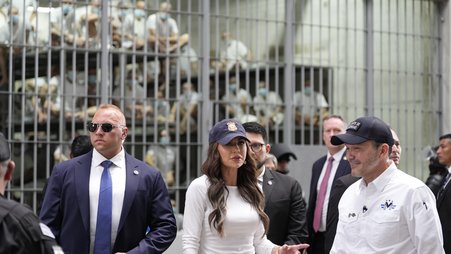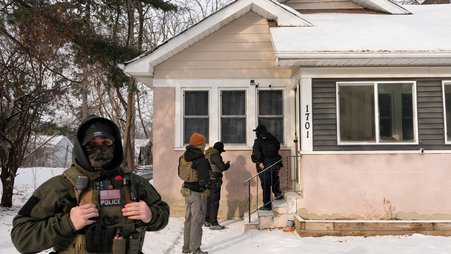In the coming weeks, we will be republishing Marcy Wheeler's coverage of the trial of CIA whistleblower Jeffrey Sterling. The following post first appeared at ExposeFacts.
Next Monday, the jury selection for the Jeffrey Sterling case will start. After a jury is selected, the trial is expected to take about two weeks.
Sterling has been accused of the following 10 charges:
- Unauthorized disclosure of defense information: Sterling was rebuffed in an Equal Opportunity complaint and lawsuit against the CIA and limited in what he could reveal in a memoir by CIA’s Publication Review Board — and thereby prevented from telling the story of how CIA had hurt his career because he is African American. The government claims that to retaliate, between February and April 2003, Sterling told James Risen about Operation Merlin, a dubious plan to deal nuclear blueprints to Iran. In 2006, that would be published as a chapter in Risen’s State of War.
- Unauthorized disclosure of defense information: By allegedly getting details of a letter about Operation Merlin published in Risen’s book, the government claims Sterling disclosed defense information.
- Unlawful retention of defense information: By keeping the letter he allegedly leaked to Risen, the government claims Sterling unlawfully retained defense information.
- Unauthorized disclosure of classified information: By allegedly providing Risen with information about Operation Merlin and the Russian operative who passed blueprints to Iran, Sterling leaked classified information while having reason to believe it could harm the US.
- Unauthorized disclosure of classified information: By allegedly leaking a copy of the letter to Risen, Sterling leaked classified information while having reason to believe it could harm the US.
- Unauthorized disclosure of classified information: By allegedly getting Risen to try to publish a New York Times article about Operation Merlin and the Russian operative, he leaked classified information while having reason to believe it could harm the US.
- Unauthorized disclosure of classified information: By allegedly leaking a copy to Risen to get him to publish a New York Times article about the letter, Sterling leaked classified information while having reason to believe it could harm the US.
- Mail Fraud: By getting Risen to distribute books via the mail, Sterling used the postal service in a scheme to defraud the government.
- Unauthorized Conveyance of Government Property: By getting Risen to distribute his book, Sterling caused government property, in the form of information about Project Merlin, to be distributed to the public.
- Obstruction of Justice: By destroying a March 10, 2003 email to Risen passing on an article about Iran’s nuclear capabilities after he had notice of the investigation into Risen’s book, Sterling obstructed the investigation into the leak.
The allegations consist of three charges (1-3) for which the government will have to prove this material was “defense information.” They consist of four charges (4-7) for which the government will have to prove the information Sterling allegedly leaked had been protected by the CIA and that Sterling knew the leak of it would hurt the US. They consist of two picayune charges (8 and 9) dealing with the distribution of Risen’s book. And they consist of one charge (10) premised on Sterling destroying an email that referenced past discussions about Iran, but which itself contained no classified information.
The government has a great deal of what thus far appears to be circumstantial evidence — notably, lots of email and phone calls between the two — showing that Sterling spoke to Risen, and spoke to Risen about Iran’s nuclear abilities. The focus of the case will be on whether those communications offer enough evidence that Sterling is the person who provided Risen the most sensitive information that appeared in the chapter of his book. Given the course of Monday’s dry run of Risen’s testimony, Sterling’s lawyers will surely emphasize that Risen has discussed “sources,” plural, and the government had previously represented to Judge Leonie Brinkema that they themselves believed they could not prove Sterling’s guilt unless Risen named his sources. That is, Sterling’s team will now try to use the government’s decision not to press Risen for testimony to attack their case. But the government only has to prove that Sterling leaked this stuff, not that he was the primary or only person to have leaked this stuff.
In addition, the government will call a series of witnesses — including his former colleagues at the CIA, congressional staffers, and possibly even Sterling’s former civil attorney Mark Zaid — to lay out how Sterling responded negatively to his Equal Opportunity challenges between 2002 and 2003. They’ll do so to establish what they claim to be Sterling’s motive: to retaliate because CIA had successfully denied Sterling any compensation for what he claims was unequal treatment because he is African American.
Sterling’s team has just renewed an effort — made unsuccessfully in 2011, just before the trial was supposed to begin — to argue he is being selectively prosecuted. Even in 2011 he had prepared a substantive motion showing that others who had done what he is alleged to were not prosecuted; he has argued that the government has only chosen to prosecute him because he made a stink about being treated unfairly as an African American. But surely the defense will point to a number of additional details — the key witnesses against him who have themselves mishandled classified information, the apparent non-prosecution of the source of the StuxNet leak, even then CIA Director Leon Panetta’s leaks about the Osama bin Laden raid — to argue he is being selectively prosecuted. Thus far, that argument remains entirely sealed; it would be remarkable, and useful, if Judge Brinkema unsealed it, as the government’s selective enforcement of secrecy rules lies at the heart of this case.
Sterling’s team will undermine the national defense and classified information charges by calling Retired Colonel Patrick Lang to explain that the CIA is responsible for any leaks of the information, and anyway its leak didn’t hurt the US; here’s a preview of what Lang will say. The prosecution had planned to call former weapons inspector Charles Duelfer (best known as the author of the report on what WMD the Iraq Survey Group didn’t find in Iraq after the invasion), though the government submitted a sealed motion on Christmas Eve that suggests they may have changed their mind about whom to call to rebut Lang. The government may also call Condoleezza Rice, who — as National Security Adviser — successfully convinced the Times not to publish a Risen story on Operation Merlin in 2003 because it was too sensitive; the government maintains this would prove that the information was closely held national security information. The government had wanted to introduce the talking points she used to make that case, but Judge Brinkema ruled the government could only do so if they called Rice as a witness.
Perhaps the most difficult challenge to rebut will be the obstruction charge (which is probably why it was included). It is entirely conceivable that Sterling did not leak any classified information to Risen, and that the reporter got the gist of his story from other sources. Even so, the government will surely argue, Sterling showed intent to protect himself by deleting that email. Sterling’s team will need to argue he did not have the intent of obstructing the investigation when he deleted the email.
Sterling’s lawyers will also face the challenge of combatting the mystique the government will create with a series of measures to protect 10 or more CIA sources (including, per a recent filing, even the Russian who dealt the nuclear blueprints to Iran). The identities of these witnesses will be closely protected, especially from the public (the jury will see their full names as part of the jury selection process, but the names will never be made public). Such measures not only appropriately protect the identities of CIA officers whose role in the government remains secret, but it will make it harder for Sterling’s team to claim that this information isn’t national defense information.
But that is what we’ll probably see: a great deal of circumstantial evidence Sterling was Risen’s source, along with a retaliation motive, and the theater to claim this was all necessarily secret, all presented to jurors who live in the heart of the government’s defense industrial complex.




